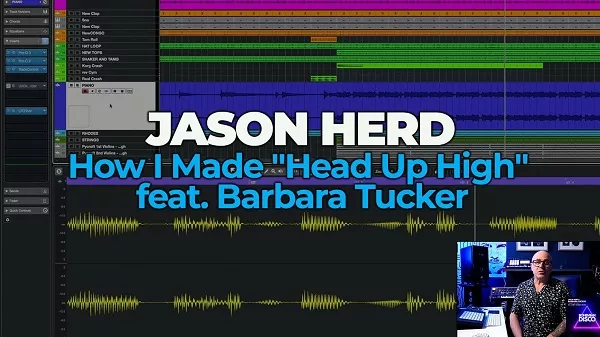
Jason Herd How I Made “Head Up High” feat. Barbara Tucker TUTORIAL
Delve into Jason Herd’s crafting of the disco house track Head Up High with Barbara Tucker and learn how to match the loudness and impact of Beatport’s Top 10. Discover his writing style, approach to collaboration and mix techniques for an energetic dancefloor hit.
Jason Herd boasts an impressive discography, with fourteen releases on Subliminal Records and numerous others on prominent labels like Size, Defected, and Toolroom. Beyond being a seasoned mix engineer and electronic music producer, he has graced the stages of Ibiza clubs like Space, Pacha, and Amnesia, as well as major festivals such as Global Gathering, Creamfields, and Stereosonic. Transitioning to focus on his label, Bohemian Disco, and a 1-1 mentorship program, Herd brings a wealth of experience and industry insights. His hiatus from regular releases underscores his dedication to refining the art of teaching electronic music production.
In this comprehensive two-hour course, Jason details his remote collaboration with Barbara Tucker. You’ll watch Jason shape each instrument and share his processing approach. He then zooms out, taking a more holistic approach, treating instrument groups on buses and on the master bus. Jason emphasizes dynamic processing, employing limiters and clippers strategically throughout his project, revealing this as his key mantra for achieving competitive loudness in mixes.
Jason dissects his Cubase project, revealing the power of an in-the-box approach for larger-than-life electronic sound. Skipping no beats in songwriting, he embraces favorite VSTs like Trilian for bass, Lounge Lizard for Rhodes, East West for orchestral strings, and Steinberg Groove Agent for drums. After these VSTs set the tonal palette, Jason invites real musicians to enhance his productions with a human touch.
Throughout thirteen chapters, Jason Herd meticulously dissects his finished track, showcasing an unwavering attention to detail as he fine-tunes every aspect. Employing techniques like sidechain compression and dynamic EQ bands, he achieves a dense mix while ensuring each element retains its space. With an ear for crest factor and headroom preservation, Jason explains his strategic use of inaudible clipping and limiting on individual elements to enhance loudness by reducing transient levels relative to the track’s RMS.
Enroll on the course to leverage Jason’s extensive industry experience as a mix engineer, producer, and mentor and gain invaluable insights to elevate your tracks. The course delivers specialized knowledge on house track arrangement, instrument-specific treatment, and preserving the natural sound of stems while maximizing headroom.
Total runtime: 2hrs 4mins
Cubase
How I Made “Head Up High” feat. Barbara Tucker
Chapter 1: Introducing the Track
Jason Herd introduces his disco house track feat. Barbara Tucker, detailing the remote recording process and pre-mix vocal stem editing.
Chapter 2: Outlining the Project
Jason details the project’s instrumentation, highlighting the advantages of employing session musicians to breathe life into arrangements.
Chapter 3: Taming Kick Dynamics
By gain staging and lowering the mixes crest factor limiting and clipping, Jason’s mix gains headroom while maintaining kick transient.
Chapter 4: Balancing the Bass
Using EQ and sidechain compression, Jason ensures both bass and kick are heard and limits the bass for a smooth low-end foundation.
Chapter 5: Shaping the Guitar
Jason cuts low-end from the guitar to avoid masking the bass, applies spatial effects to the stem and clips to preserve headroom in the mix.
Chapter 6: Bringing VSTs to Life
To make keys less VST-like, Jason applies compression for dynamics, saturation for color, and introduces sidechain movement.
Chapter 7: Humanizing the Strings
Jason brings a human touch to his VST strings with a session player. Routing all strings to a bus, he applies filtering and saturation.
Chapter 8: Editing and Processing Vocals
Jason discusses readying remotely recorded vocals for mixing and how he employs multi-stage compression and spatial effects sends.
Chapter 9: Analyzing Mix Routing
Jason details his bus routing and processing choices, refines crest factor with clipping, and evaluates the track against his references.
Chapter 10: Maximizing Vocal Interest
Jason crafts a vocal performance that has narrative shape aided multiple spatial send options, sidechain carving and panning arrangements.
Chapter 11: Carving Space for the Vocal
Vocal clarity is enhanced by identifying the voice’s frequency band and sidechaining this EQ band to trigger ducking on the instrument bus.
Chapter 12: Preparing for Master
With mastering headroom in mind, Jason uses soft clipping on the instrument bus to further control the mix’s dynamic while maintaining tone.
Chapter 13: Gluing the Master Bus
Jason shapes the mix on the master bus, adding warmth with analog emulations. He ensures translation by listening through various speakers.
- Share on Facebook




